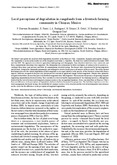Mostrar el registro sencillo del ítem
Local perceptions of degradation in rangelands from a livestock farming community in Chiapas, Mexico
| dc.contributor.author | Guevara Hernández, F. | es_ES |
| dc.contributor.author | Pinto, R. | es_ES |
| dc.contributor.author | Rodríguez, L.A. | es_ES |
| dc.contributor.author | Gómez, H. | es_ES |
| dc.contributor.author | Ortiz, R. | es_ES |
| dc.contributor.author | Cruz, Georgina | es_ES |
| dc.contributor.author | Ibrahim, Muhammad Akbar | es_ES |
| dc.date.accessioned | 2015-11-18T06:02:01Z | |
| dc.date.available | 2015-11-18T06:02:01Z | |
| dc.date.issued | 2013-06-12 | es_ES |
| dc.identifier.uri | https://repositorio.catie.ac.cr/handle/11554/7745 | |
| dc.description.abstract | The farmer’s perception was analyzed about degradation of pastures in the Francisco Villa I community, Jiquipilas municipality, Chiapas. The community is located in the nearby area of the biosphere reservation La Sepultura. The study was conducted between December 2008 and July 2009. The approach was related to agricultural anthropology and ethnography. Semi-structured interviews were carried out, and three communitarian workshops were organized. The information was systematized in tables and figures of tendencies for its analysis according to three times: past, present, and future of communitarian livestock rearing. The farmers were characterized by having rangelands and livestock, living in the community permanently, and willing to be involved in the process of analysis of this research. The results showed that farmers perceive the current degradation of their rangelands as an aspect intrinsic to the practice of the livestock system with diverse impacts. However, in regards to the past, they did not perceive relevant or significant changes in their rangelands. Farmers were optimistic in regards to the future, because they perceived that their rangelands were little degraded. The reason was the presence of operating elements supporting communitarian livestock rearing. They considered as very relevant the implementation of “less harming” practices, although they showed that the lack of technical advising and economic resources was an important limitation. It was concluded that, in Francisco Villa I, there are differences in the perceptions of degradation, but basically from the productive perspective. The individual experience as to livestock management, the family income, the availability of economic resources to be invested, and the level of environmental consciousness are the causes for the differences in the perception of rangeland degradation. | es |
| dc.language.iso | en | es |
| dc.relation.ispartof | Programa Agroambiental Mesoamericano (MAP). Fase I | |
| dc.subject | PASTIZALES | es |
| dc.subject | TIERRAS DE PASTOS | es |
| dc.subject | DEGRADACION DE TIERRAS | es |
| dc.subject | EXPLOTACIONES GANADERAS | es |
| dc.subject | CHIAPAS | es |
| dc.subject | MEXICO | es |
| dc.title | Local perceptions of degradation in rangelands from a livestock farming community in Chiapas, Mexico | es |
| dc.type | Artículo | es_ES |
Ficheros en el ítem
Este ítem aparece en la(s) siguiente(s) colección(ones)
-
Publicaciones y documentos [4421]


